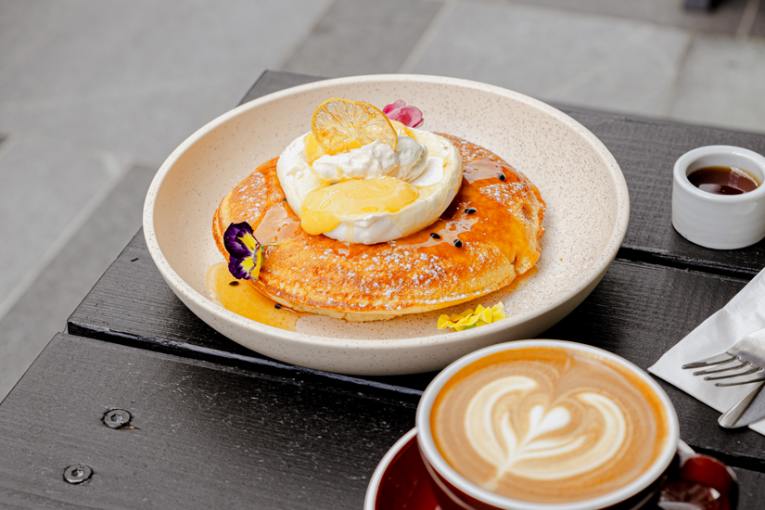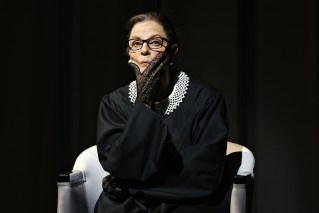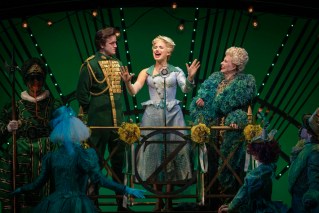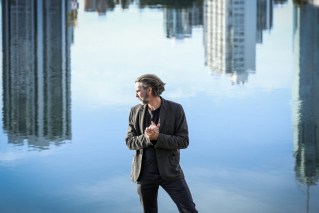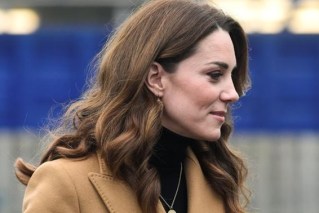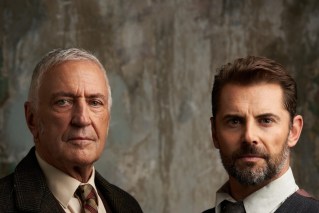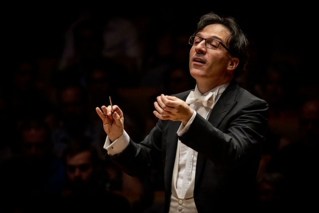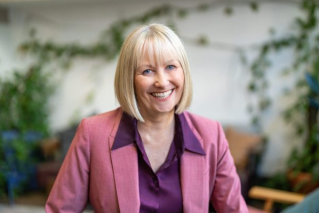John Waters reignites reign of terror in The Woman in Black
The return of the most terrifying live theatre experience in the world – The Woman in Black – also ushers the return to the stage of a much-loved Aussie icon
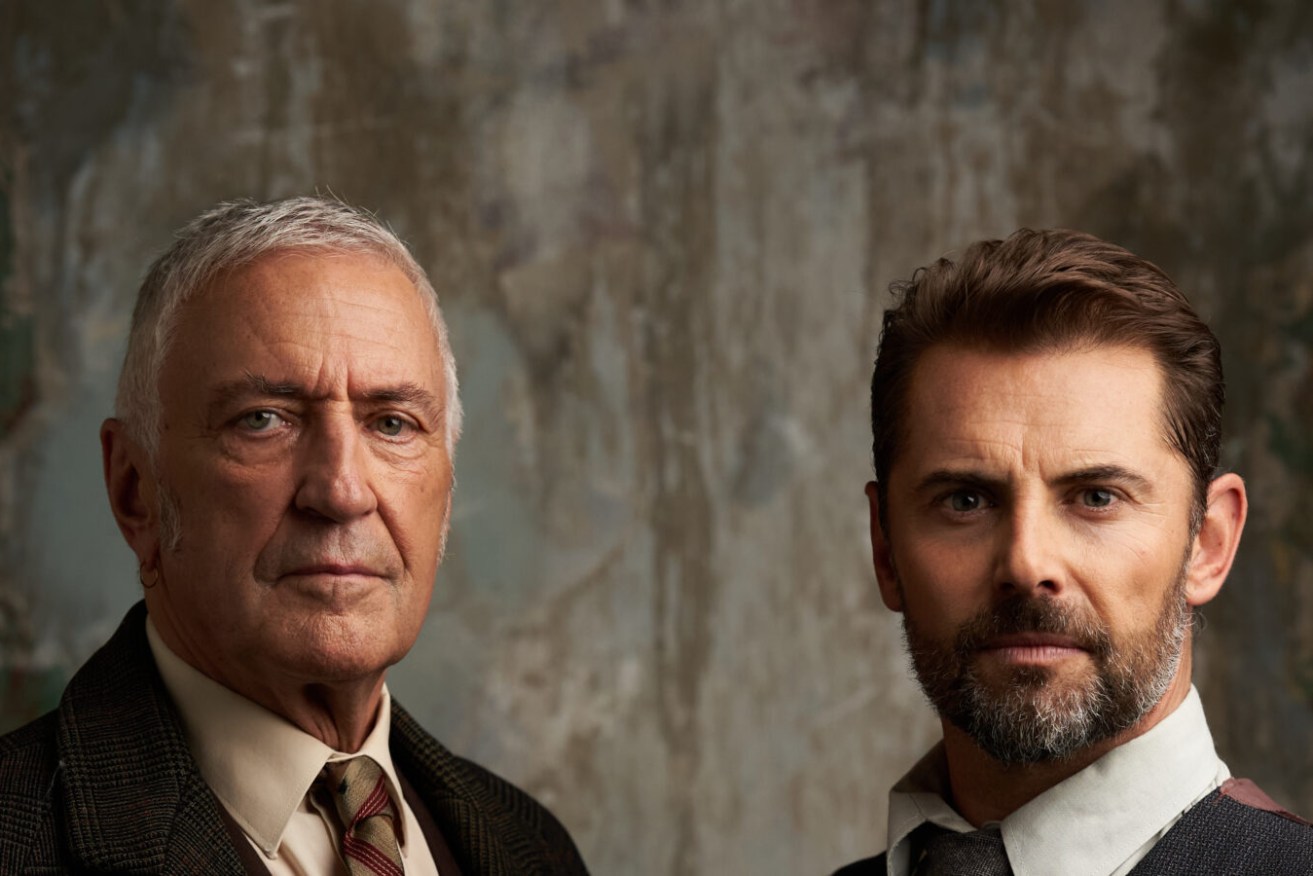
John Waters (left) reprises the role of Arthur Kipps, starring alongside Daniel MacPherson in The Woman in Black, dubbed “the most brilliantly effective spine chiller you will ever encounter”.
Written by Gillian Cumming
John Waters sounds impressed when I tell him I was in the audience of love-rock musical Hair in 1971 in Brisbane.
We’re on the phone to chat about his upcoming stage play The Woman in Black, dubbed “the most brilliantly effective spine chiller you will ever encounter”, in which Waters reprises the role of Arthur Kipps who, under great duress, recounts a ghostly tale.
The second-longest-running play in London’s West End behind Agatha Christie’s Mousetrap, The Woman in Black returns to theatres across Australia at the end of April after an 18-year hiatus. But back to Hair.
Waters, 75, is a much-admired A-lister in the Australian film, television, stage and music industries. He’s done it all and most things he’s touched have turned to gold. He was also a bit of a pin-up boy, bringing an unreasonable amount of sex appeal to whatever he did. Think Play School.
So I tell Waters I saw him in Brisbane in 1971 in the American stage musical, starring as Claude who’s been drafted into the army to serve in Vietnam.
And that’s how we get to the beginning of the Waters story – as Waters didn’t play Claude in Brisbane. After two years in Australia, touring with Hair, Waters returned to his birthplace in the UK.
“Hair was banned in Brisbane for a while,” he adds wryly, as an aside, “because we said certain four-letter words out loud on stage, which you can do anytime you like now.”
That sounds like Brisbane in the ‘70s.
Waters first arrived in Australia in 1969 as a Ten Pound Pom. Then he went home, but then he came back.
“I was 19,” he says. “My Uncle Tom, my father’s brother, had spent time in Australia and he’d told me a lot about it and I found it fascinating.”
Waters grew up in south-west London, his Scottish father Russell was a well-known TV and film actor. As a child Waters spent time around film studios and dabbled in acting.
“I’d been in a rock’n’roll band for a while, but it wasn’t getting anywhere,” he says. “We didn’t have a recording contract and were doing small gigs.”
With thoughts about Australia lingering, Waters walked into Australia House in London and applied for assisted passage.
“I thought, I’ll go for a two-year working holiday. It was curiosity and wanderlust on my part. No real intention to move permanently.”
On arrival, he was plucked off the street by Hair director Jim Sharman to play the role of Claude, not knowing that the radical free love musical’s success would keep him in the production for the next two years, after which Waters returned to the UK as planned.
“After I got home, I thought, this is a mistake,” he recalls. “England in 1971 wasn’t a great place. So I borrowed some money and went back to Australia.”
For the next 50-plus years Waters carved out a stellar career – from his 20-year stint as a presenter on ABC-TV’s Play School to leading roles in TV dramas Rush, All the Rivers Run, Rake, Offspring, Mystery Road and many others.
The list of films is also long and includes Tim Burstall’s End Game, Breaker Morant and 1988’s Boulevard of Broken Dreams (winning an AFI Award). His stage work includes Hair (with Marcia Hines), Godspell and Jesus Christ Superstar along with The Rocky Horror Show, They’re Playing Our Song (opposite Jackie Weaver) and The Sound of Music (opposite Lisa McCune).
Music was always a constant in the background and in 1992 Waters and Stewart D’Arrietta debuted the John Lennon tribute show Looking Through a Glass Onion in Sydney.
The part-concert part-monologue one-man production became a hit and has reappeared often across Australia over the past 30 years (I saw it twice and it definitely was Waters on stage), including a stint off-Broadway in New York as well as seasons at London’s West End, Edinburgh, Liverpool and Tokyo.
Next year Waters plans to tour nationally with his new show Radio Luxembourg, celebrating the songs and nostalgia of the British pop invasion of the ‘60s – gems like Where Do You Go To My Lovely, Waterloo Sunset and The Who’s My Generation.
But now Waters is about to step back on stage as Arthur Kipps in The Woman in Black, in the role he debuted in Australia in 2006, playing opposite Brett Tucker. This time around, Waters pairs with Daniel MacPherson (Neighbours, The Bill).
Based on the 1983 gothic novella by Susan Hill, Stephen Mallatratt’s original 1987 stage adaptation at Scarborough in the UK has been described as “a brilliantly successful study in atmosphere, illusion and controlled horror” as the audience is transported to Eel Marsh House in the village of Crythin Gifford in England’s north.
Back in 1987, the Scarborough theatre wasn’t flush with funds so manager Robin Herford decided, with Christmas upon them, to do a ghost story that could be staged cheaply and quickly – in the theatre’s bar. He asked the venue’s resident playwright, Mallatratt, to write it and told him the set and costumes couldn’t cost more than £1000. The play sold out and is now a worldwide hit.
Mallatratt’s masterstroke was to make The Woman in Black a play within a play, one with just two speaking actors and a backstage crew. The elderly Arthur Kipps (Waters) employs a young actor (MacPherson) to help in a public telling of the spooky events at Eel Marsh House. The audience is about to witness a kind of exorcism.
When Waters first starred in the play in 2006 he had a three-year-old son. Now that son Archie is 21 and he also has 17-year-old twins, Gloria and Rusty, with his wife Zoe Burton. Waters also has two adult children, Rebecca and Ivan, in their 50s, from an early relationship.
“When I first performed The Woman in Black I had my son Archie and my wife was pregnant with the twins,” he says. “I don’t feel that removed from those days. It’s 18 years ago, but one of the things about getting older is that time concertinas itself.”
Waters was 34 when his dad passed away at age 74. His Mum Barbara died at age 95.
“When you lose a parent it often doesn’t matter whether you had a fabulous relationship with them – and I’m lucky I did have a fabulous relationship with my dad – because losing a parent is different to losing anyone else,” he says. “You feel like a part of your body, an arm or a leg, has been chopped off.
“This play does deal with fear of loss within a family. Parents fear when their children are away. What’s going to happen to them? The world’s full of dangers – and all of that. You learn to be fatalistic. Teach your children to take care, but looking back at your own youth, you think, oh, well, they’re going to be like me. There are risks to take.”
Water regards The Woman in Black as one of those surprise success stories, created by happenstance.
“It was a unique development in theatre at the time,” he says. “It’s a rarity to have a play with this kind of suspense and supernatural elements that are genuinely scary. As Robin Herford, said to me, ‘it was a Christmas stocking filler’.
“It’s been so skilfully done that it had a massive effect on audiences. And that’s what you want. That’s what’s kept this play going so long.”
So why is the play so spooky? Waters says it’s the inescapable atmospherics that create the suspense from the word go.
“The audience is kept wondering. What is this man so terrified of?” he says. “Why does he feel he has to enact a story from his past to exorcise himself from some source of hidden horrors which we don’t yet know about?
“And as the play goes on, things get more and more mysterious. It’s a while before the first experience of something is a genuine shock to the audience. These moments are skilfully placed here and there from then on. They’re never overdone so that they have maximum effect when they do occur.
“It’s up to the two performers (Waters and Macpherson) to create that atmosphere. There’s an overworked phrase that as an actor I am a storyteller … but in this play, you really are a storyteller. You have to tell it with a vivid commitment to the audience. It’s a fabulous challenge for two actors.”
Part of the suspense is built off-stage. Waters can’t say too much, but he does say that there is use of an “incredibly atmospheric soundscape – which lends an incredible air of reality to their storytelling and in some ways is the third actor in the piece”.
The Woman in Black plays the Empire Theatre, Toowoomba, April 27, 2pm and 7.30pm; and the Playhouse, QPAC, April 30 to May 11, before touring nationally.
This article is republished from InReview under a Creative Commons licence. Read the original article.
InReview is an open access, non-profit arts and culture journalism project. Readers can support our work with a donation. Subscribe to InReview’s free weekly newsletter here.![]()
